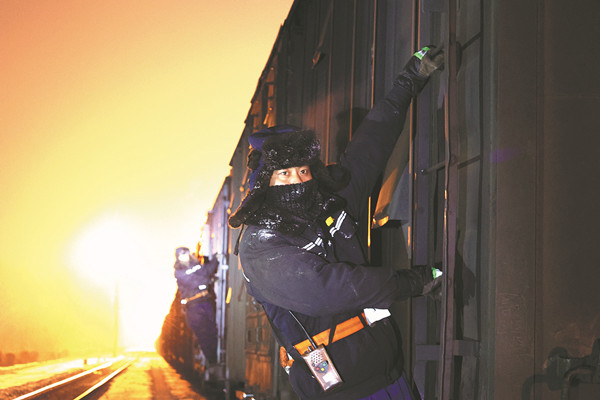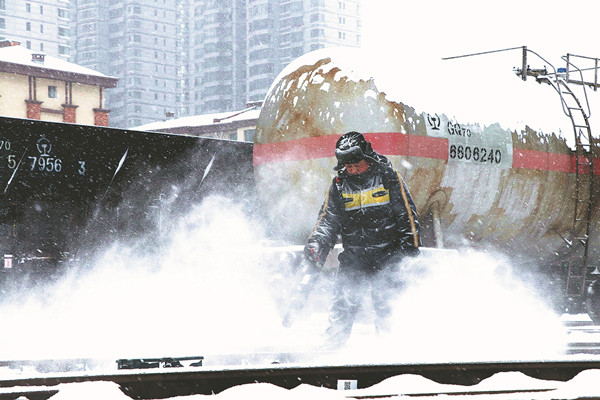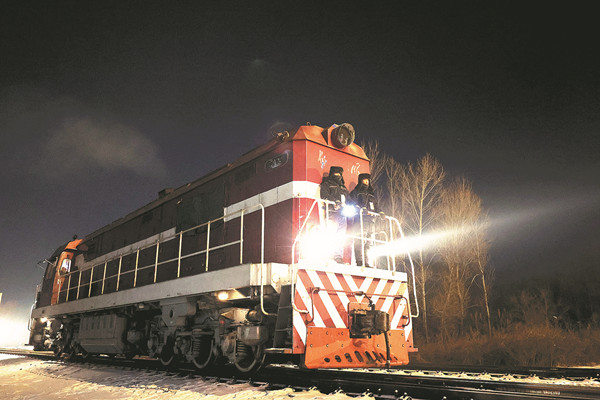
Dispatchers work at Qipan Railway Station in Jilin city, Jilin province, last month. [Photo/China Daily]
Come snow, wind or heat, dispatchers in Jilin province are always on duty
On the morning of Jan 22, the first day of the Year of the Rabbit, Lu Hailong returned home after work for a family reunion dinner with his parents. The big Lunar New Year dinner is usually had on Lunar New Year's Eve, but because of work, Lu had to wait a little longer to enjoy it.
It was the first New Year that Lu spent on the job at Qipan Railway Station in Jilin city, Jilin province.
"It was also the first time that I welcomed the Lunar New Year without my family," said the 23-year-old railway dispatcher. "However, I was proud of contributing to the smooth flow of freight trains taking coal to power plants and daily necessities to people during the most important festival in China."
Despite temperatures that plunged below -30 C during the festival, Lu and his colleagues remained at their posts outdoors.
Located 19 kilometers from the city, Qipan Railway Station is Jilin's largest freight train marshaling station. It disassembles 54 trains and reassembles 48 every day.

A dispatcher clears snow along the railway at the station. [Photo/China Daily]
Divided into four groups, the station's 44 dispatchers have a number of other responsibilities in addition to the assembly and disassembly of trains, and as carriages are shunted around the site, the dispatchers have to hang off them to make sure everything goes according to plan.
"There are no buildings around where we work, so there's nothing to stop bitterly cold winds from sweeping in during the winter," said Ji Hai, head of the dispatchers. "We wear really thick clothing, but the wind can easily get through even heavy cotton."
The weight of the clothing doesn't help with climbing onto carriages or walking through the snow.
"Every work day, we have to walk around 20 km on patrol," Ji said. "Every dispatcher keeps at least two pairs of shoes ready in the winter because they get soaked through after working outside for a few hours, but after years of experience, the dispatchers all try their best to walk fast and work efficiently."
Another challenge is clearing the snow. The station's many switches and devices only function properly when they aren't covered in snow, so all the station's employees have developed the habit of clearing it away.

Two workers ride on a locomotive while shunting it around the site. [Photo/China Daily]
As soon as it begins to snow, all the employees, including those who are off duty, quickly assemble to clear it. But as it quickly covers freshly cleared lines again, the workers have to keep sweeping until it stops. They often have to eat their meals quickly. Sometimes they receive a new task even before they've finished, and with food still in their mouths they have to race back to work.
Other times they skip meals altogether, saving time going to the canteen by eating something quick in the employee lounge from their lunch boxes.
During the summer, the carriages often become dangerously hot.
"It is easy to get burned while hanging onto the carriage because their surfaces can heat up to over 50 C under the sun, so we always wear gloves and long-sleeved clothes no matter how hot it gets. Walking on the gravel beside the tracks, we really feel the heat, and the soles of our shoes quickly wear down," Ji said.
"To be honest, we work really hard in a tough environment, but it's our job to make sure transportation is safe and smooth, especially during the Spring Festival."







